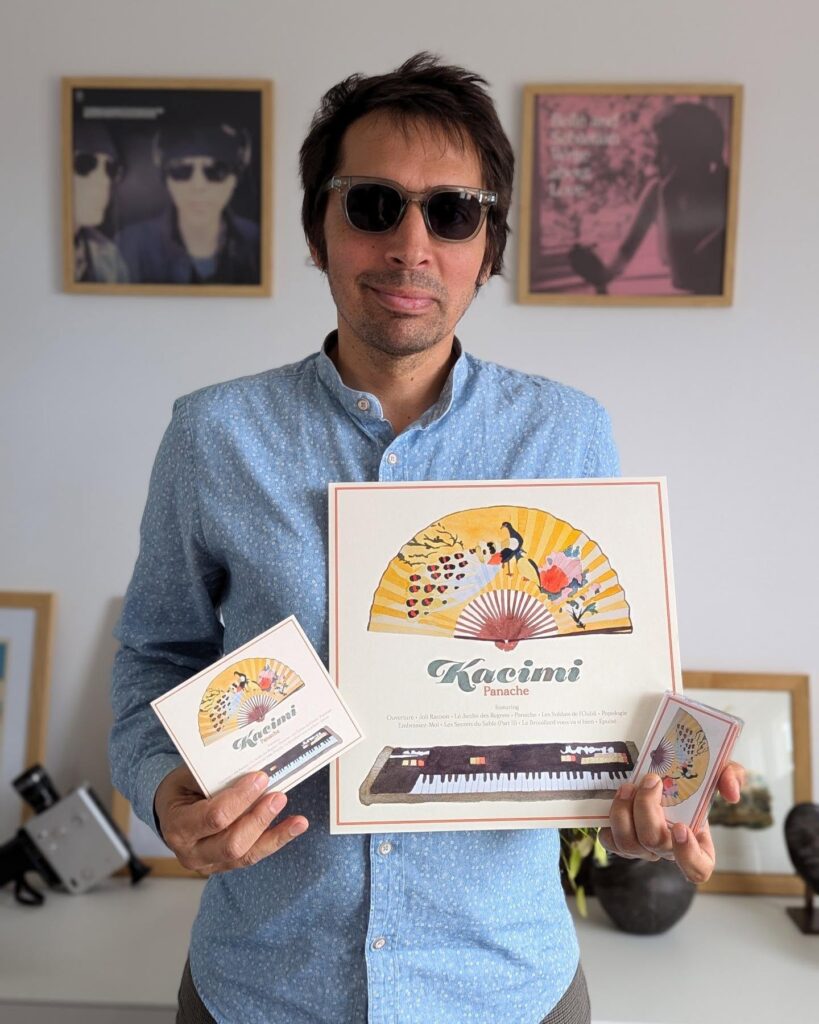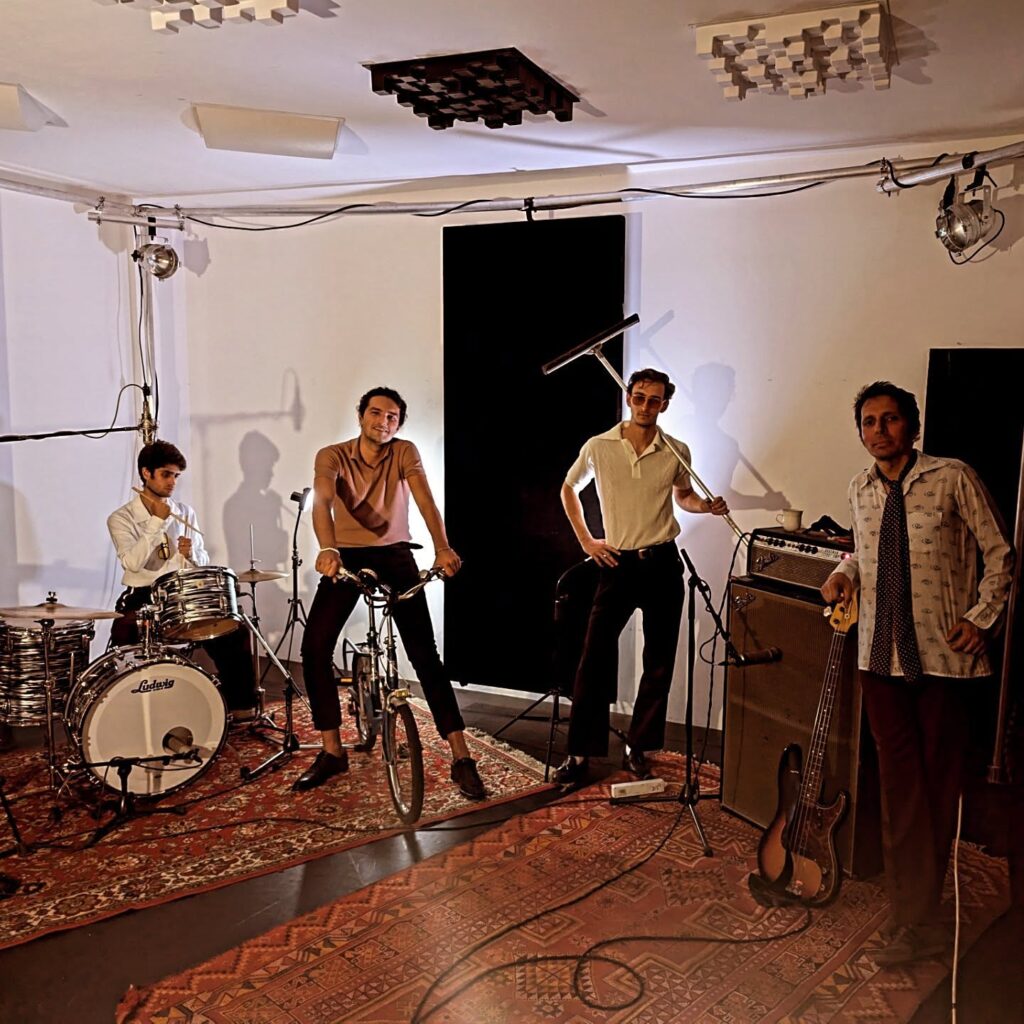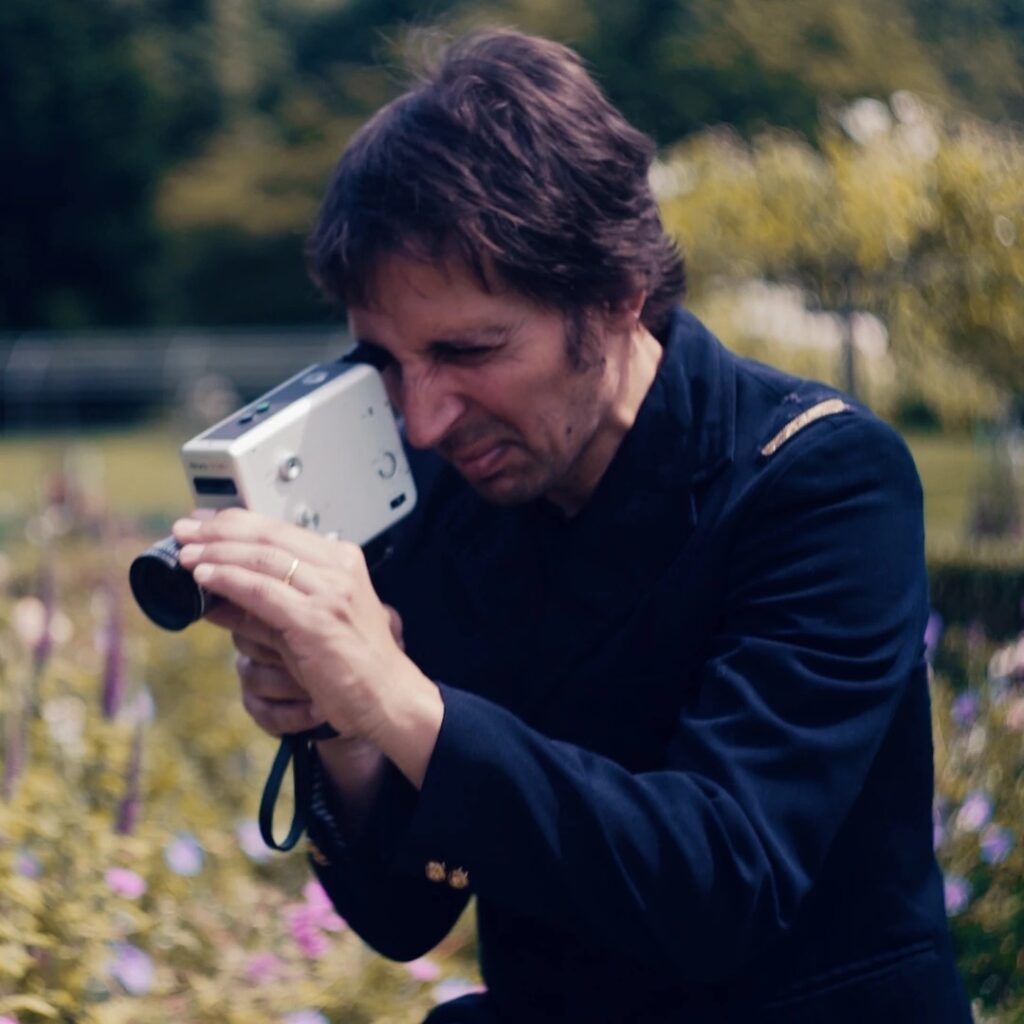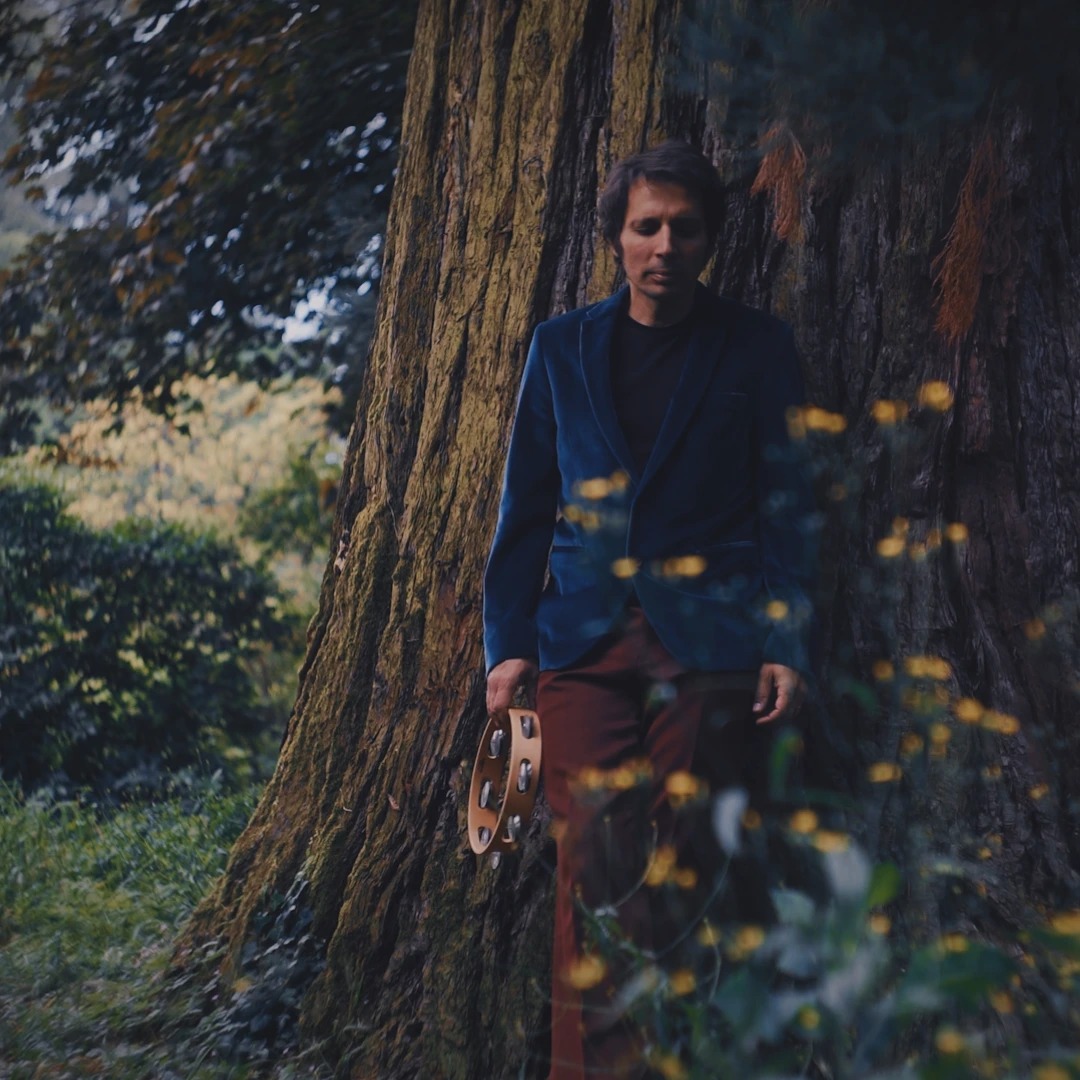Kacimi | Interview | New Album, ‘Panache’
Kacimi’s fourth solo album, ‘Panache,’ feels like a quiet act of defiance — a gentle refusal to chase trends or shout for attention.
It’s an album that draws you in slowly, weaving elements of French pop with flashes of cinematic charm, subtle steel drums, and reverberating piano notes that seem to hang in the air like half-remembered dreams. Rather than aiming for the grandiose, Kacimi focuses on the small, resonant moments — the kind that reveal themselves with each listen. The contributions of collaborators like lyricist Romano Bianchi add further depth. Rooted in a love for film soundtracks, ‘Panache’ has the feel of an album made on its own terms. It’s the sound of an artist at peace with his process. In the following interview, we discuss his latest album, previous projects, and his work behind Le Pop Club Records..

“Playing solo has allowed me to avoid stylistic barriers while trying to build a coherent discography”
‘Panache’ is a far cry from the guitar-driven garage rock you’ve been known for with The Rebels of Tijuana. What sparked the shift to dreamy synths and piano compositions?
Kacimi: Let’s just say I like a lot of things in music, from ’60s garage to cool jazz, folk music, and more modern electro-pop. Playing solo has allowed me to avoid stylistic barriers while trying to build a coherent discography. Indeed, playing the piano has taken me into new territory. A few years ago, I started playing it more seriously for Romano Bianchi in concert. I also picked up my grandfather’s old piano when he passed away. A lot of things made me want to compose differently, letting myself go on the piano at my humble level.
You’ve teamed up with Augustin von Arx and Léonard Persoz for this new record.
Yes, that’s right. Basically, the deal was very simple: I’d come up with some guitar-voice or piano-voice tracks, and we’d put the whole thing together in the studio. I’ve known these musicians for a long time, and we’ve shared quite a few projects. So yes, they got me out of certain studio habits, working with more synthesizers and pads. They’re rock musicians—Augustin is a drummer, and Léonard is a guitarist—but they’ve already been moving into electronic territory for several years, in an uninhibited way. During these sessions, I learned to relax and appreciate the choice of arrangements. In fact, everything was possible; we were really experimenting and took the time we needed. They were incredible.
The album has this kind of serene, almost cinematic vibe, but with a touch of absurdity in Romano Bianchi’s poetry. Does the music ever contradict the message?
Well, it may be cliché to say so, but I composed the vast majority of these tracks during confinement. They’d been lying around in my head, and I put them together two years ago to prepare the record. I knew before recording that we were going to touch on something very gentle, very dreamy, very poetic. I write a lot of songs with Romano Bianchi. We know each other well, and without us saying anything to each other, he really gets me. Yes, there’s a certain existential questioning, and going into this sonic terrain was finally an obvious choice. I had Mort Garson’s ‘Plantasia’ in mind—a gently nostalgic, cartoon-like atmosphere. I think we just let ourselves go with it.
Looking back at ‘Cookies & Motoriders,’ ‘Gyrophare,’ and ‘Couronne d’Ephémères,’ how do you think your sound and storytelling have evolved—or devolved—over the years? Is ‘Panache’ a culmination of all those past influences, or did you burn the previous versions of yourself to reach this point?
I like the idea of being able to renew myself regularly. As I said earlier, I compose by period, and the piano has helped me evolve on these tracks compared to those on my previous albums. I’m always hoping to progress too. After all, I always have a harmonic touch of my own that comes back regularly, whether I like it or not. Since I finished recording ‘Panache,’ I’ve recorded a lot of things with very different musicians. I’ve redone some very rocky things with the live band that accompanies me, La Mécréance. I’m preparing several singles for release in 2025. ‘Panache’ did me a lot of good artistically, and I feel like anything is possible now. I’m pretty excited. We’ll just have to channel that. Haha!
When you’re conjuring up those hazy, nostalgic melodies, do you ever feel the ghosts of the ’60s and ’70s creeping in, or are you more interested in reimagining those eras through a modern lens?
I’m first and foremost a big fan of pop culture, and ultimately of history. I constantly feel like I’m jumping back in time with cinema, literature, music, and art. I don’t share that with many people. It’s very personal, and it’s complicated to express. I sometimes feel like I’m ultra-sensitive when it comes to culture. I’m sometimes criticized for being too elitist in my tastes, even though I listen to a huge amount of music and very different things. If I hear ‘God Only Knows’ by The Beach Boys in the supermarket, I’m going to get huge thrills, even though I’ve heard it 1,000 times. I’ll feel like the king of the world with my caddy. At the same time, I have a lot of trouble with revival stuff. I’ve often played at ’60s festivals, and I quickly overdose on ’60s garage. I think I draw a lot from the past, perhaps more than some of my peers, but my approach is a modernist one. I’m not revolutionizing music, but I constantly want to create new things. I want to keep an eye on the future, just like the basic principles of mod culture.
Recording in the Geneva countryside, surrounded by a bamboo garden and a vegetable patch, sounds like a far cry from the sweaty club shows and city streets.
In the simplest way possible. Augustin has his studio in his mum’s house, which overlooks a garden just outside Geneva. We started the sessions there. We thought we’d go somewhere else for the rest of the album, but the location helped shape the spirit of the record. All the watercolour elements on the album cover come from this house and the studio. It just seemed obvious.
You’ve had this long history of working with various bands and collaborators, but ‘Panache’ feels like it’s deeply personal. Do you feel like your solo work allows you to explore more vulnerable themes?
Yes, I’m getting old. Haha! I have a beautiful daughter, and I think children are a bit like our own mirror. It’s changed a lot of things in my approach to life. I’m not going to talk about maturity; I can still be a real teenager, and that seems pretentious to me. In fact, I don’t think too much about it, but I believe things happen naturally, and I reached a point where I had to do it. The exciting thing about music is that you’re always in a bit of danger. The absurd is always present, and that helps me move forward without having to justify myself too much.
Your work with Le Pop Club Records has put you in the position of both creator and curator. How does that dual role impact your own creative output? Does running a label ever make you think, “Hey, I’ve got to outdo these other records I’m releasing?”
That’s a good question. I think it puts a lot of positive emulation between us. For me, it’s always very exciting to hear new things, and I really enjoy the work of my musician friends. They’re the first people I talk to. Le Pop Club is a micro-label, so we do things in a fairly artisanal way, and these days the music business means that we often wear several hats.
Le Pop Club Records has released almost 80 titles, from contemporary artists to classic French film soundtracks. Does one ever end up influencing or even interfering with the other?
I think the two are always intertwined. I put a lot of passion into Le Pop Club and into the records I release for other people. It’s all about the music, but it’s also about the relationship between the musicians. We’re here to have fun and put out great stuff. For the last two years, I’ve been trying to take more time to create and put myself in a bit of a bubble where I’m not just thinking about the label.
Le Pop Club has carved out a niche in reissuing iconic French film soundtracks on vinyl. What draws you to this particular era of music?
I approach cinema like I do music. I’m going to be interested in the aesthetics, the colours, the scenarios, and those faces, those stories, if we focus on French cinema. I can re-watch a Jean-Pierre Melville film hundreds of times, just as I would go back to a Byrds album. And I love France in the ‘60s and ‘70s. It makes me think of my grandparents’ or parents’ lives. I’m a child of the ‘80s, and I think there’s a reassuring side to all this. Once again, I think I’m doing these reissues to get to the bottom of the things I’m passionate about.
You’ve dipped into the world of film music recently, reissuing classic French soundtracks and composing for series like Emily in Paris. How does that cinematic approach creep into ‘Panache’?
I haven’t thought too much about it, but I think I’m completely immersed in film music, and that influences me. I’ve listened to a lot of rock and jazz, but over the last 10 years, I’ve really delved into film music. There are a lot of re-releases, so you have access to a lot of things. I’m always going to work on a song structure, but I’m subconsciously more influenced today by John Barry’s guitars or Morricone’s themes than by my first love of Britpop.

You’ve collaborated with an impressive roster of artists like Lionel Limiñana, Nick Wheeldon, and Alexis Fugain. What’s the secret sauce to a good collaboration, and what’s the recipe for disaster?
Let’s just say that we do everything we can to make things cool. Collaborating is a form of mutual respect. If I take Lionel from Les Limiñanas as an example, he’s a super relaxed guy who does things for the love of the music. You just have to learn to let go so that everyone can find their place. I worked a lot remotely for these collaborations, and I’m in the process of preparing several more. You have to relax in terms of time and be ready to get things moving. You put so much passion into it that you have to learn to breathe. No, it’s great — I’m very happy to be able to do this. I’m looking forward to presenting several more in 2025. As for the chaos, I’ll be telling a few anecdotes in a while. It’s still a bit too early! Haha.
Romano Bianchi’s poetry is scattered throughout ‘Panache’. How did you two work together on shaping the narrative of this album? Was it more like he handed you a bunch of words, and you thought, “Okay, time to make this sing,” or was there a back-and-forth in shaping the stories?
No, there’s no real story. We haven’t stopped since the conception of my album ‘Gyrophare’ in 2019. I’ve done a lot of demos and I’m still working on them. He wrote on top of that. He’s a real poetry war machine. He’s written an incredible number of lyrics, especially as he was composing at the same time for these albums. He also accompanies me on drums in concert. For ‘Panache,’ there were lyrics from different periods that I put together on my own to build the album.
In 2024, when people talk about French pop and its evolution, where do you see yourself fitting in that narrative? Are you preserving the essence of yéyé and beat, or do you see your work as a complete subversion of what came before?
No, I’m evolving. I’m not ruling out the possibility of remaking yéyé songs. We do a pretty garage thing live. We’ve been playing the Rebels of Tijuana’s first mini-hit single ‘J’adore ce flic’ ever since. I’m really enjoying this approach of doing different things in the studio and on stage.
Some might say there’s a kind of melancholic joy to your music — a balance between introspection and carefree vibes. Does that come from life experience?
I think it’s a whole, as I explained earlier. If I think globally, I try to play on this balance — mixing life experience with letting go of influences and day-to-day life.
You’ve been writing, recording, and performing for over twenty years now. What’s the one piece of musical advice you’ve ignored—and are glad you did?
I think I’ve always done what I really wanted to do without letting myself be influenced by the tedious professional side of music that exists, particularly in France, with its codes and conventions. So maybe I’ve missed a few developmental milestones, but I don’t really give a damn! Likewise, with Le Pop Club, I pushed the idea by trying to be completely independent, which also has its limits (especially financially) without having to justify myself with a subsidy or a shitty partnership. It’s all about passion and the pleasure of doing things. After that, people like it or not — it doesn’t matter.
If ‘Panache’ had a theme song or a signature sound, like a key that unlocks the entire album, what would it be?
I like the idea of the memory lost deep in the reverb of the piano. Yes, the sound of the garden was somehow present in the process. I was dreaming of steel drums during the session — that instrument found in calypso, which I discovered on a seventies album by Van Dyke Parks. Augustin fulfilled my request. As a result, you can hear this instrument in the finale of the album on the track ‘Épuisé’ and also in the opening sound. I just love it!
When you look back on your career — from The Rebels of Tijuana to Le Roi Angus, to your solo journey — what’s the thread that ties it all together? Or do you prefer to think of each phase as a completely different life lived?
I think there’s a continuity. I started in the early 2000s with some fantastic musicians in Lyon: A*Song, Fireball FC, The Rams. These projects were extremely formative, both musically and on a human level, and I think I’ve always sought this type of artistic interaction. Well, I hope I’ve improved since then! Haha. I’m always on the lookout for great songs. I haven’t budged on that front, and I’m not going to stop. When I meet old friends who have sometimes stopped making music, I have fun telling them that I’m going to go all the way — creating a continuous body of work! Haha.
Is there a particular era or scene that you’d love to be a part of, if only for a day? Maybe Paris in the 60s, or the underground clubs of the 90s? Or are you more content shaping the one you’re in right now?
Live the era of West Coast jazz in the 50s for all it’s worth. The saps, the music, the cars! I’m reading the Blacksad comic at the moment, so that must be why! Haha. Let’s just say that what’s missing nowadays is taking the time. It’s a time when you had time to dream and be at peace. The internet has destroyed a bit of that.

Finally, what’s something you haven’t been asked yet about ‘Panache’ that you wish someone would dig into?
‘Panache’ is a milestone for me. A fourth solo album in my discography. You can take an album in a thousand ways. I hope people enjoy it and come back to it for the thrill. I often rediscover albums that I’ve listened to many times before. I think it’s an album that takes time and invites you to slow down a bit. It was made with that in mind. It’s an album for the living room — at home when you want to feel good at home.
Klemen Breznikar
Kacimi Facebook / Instagram
Le Pop Club Records Official Website / Facebook / Instagram / Bandcamp / YouTube




